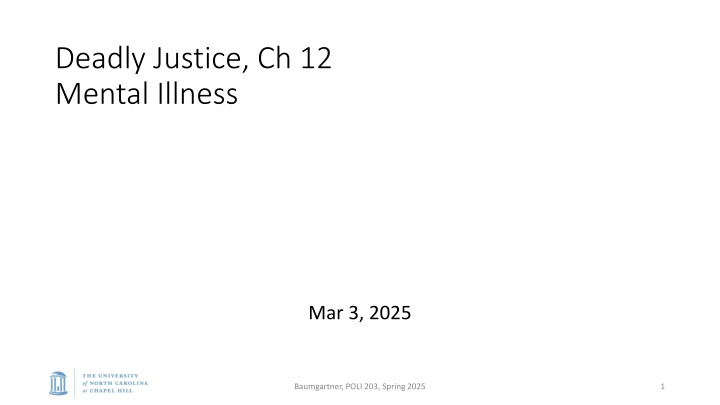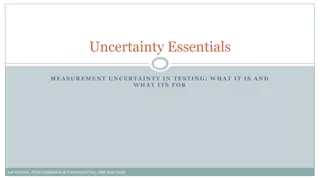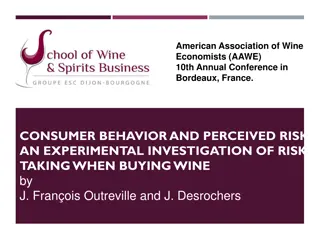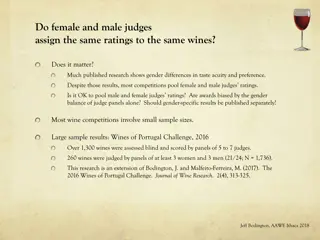Measurement Uncertainty in Wine Analysis
This content discusses the measurement uncertainty in wine analysis, focusing on the general approach, single within-laboratory validation, precision data, and levels of uncertainty. It covers sources of uncertainty, quantification methods, and the importance of reproducibility in obtaining accurate results.
Download Presentation

Please find below an Image/Link to download the presentation.
The content on the website is provided AS IS for your information and personal use only. It may not be sold, licensed, or shared on other websites without obtaining consent from the author.If you encounter any issues during the download, it is possible that the publisher has removed the file from their server.
You are allowed to download the files provided on this website for personal or commercial use, subject to the condition that they are used lawfully. All files are the property of their respective owners.
The content on the website is provided AS IS for your information and personal use only. It may not be sold, licensed, or shared on other websites without obtaining consent from the author.
E N D
Presentation Transcript
Deadly Justice, Ch 12 Mental Illness Mar 3, 2025 Baumgartner, POLI 203, Spring 2025 1
Mental Health Betsy Neill: senior thesis project All kinds of paradoxes and strange legal rulings associated with insanity and mental illness Look up these cases: James Holmes (Aurora Colo. movie theater shooter, 2012) John Hinckley (shot but did not kill Pres. Ronald Reagan, 1981) General idea: vulnerability Having mental illness may lead to: Bad crimes (depending on the nature of the illness) Lack of ability to cooperate with defense attorneys, poor judgment Lack of empathy on the part of the jury, as the defendant may not act right in court Baumgartner, POLI 203, Spring 2025 2
Court rulings Constitutional issues Atkins v. Virginia (2002): low IQ prohibits execution (contradicting 1989 Penry v. Lynaugh, holding that it was ok; evolving standards of decency ) Ford v. Wainwright (1986): inmate must understand the reason for execution Several cases: can the state forcibly medicate the person, to make them sane enough? Mental Illness and intellectual capacity separate issues Illness at the time of the crime (not currently proscribed; Atkins refers to intellectual capacity, not mental illness) Illness at the time of execution (must be able to understand what execution is, and that it is a punishment for the crime, according to Ford) Note: Texas future dangerousness may make illness an aggravator Note: Juries make decisions; their understanding of mental illness may be full of cultural assumptions about dangerousness, even if not true. Baumgartner, POLI 203, Spring 2025 3
Ford v. Wainwright requires that you be mentally competent and understand why you are being executed. See this story about Rickey Ray Rector, executed in 1992 by Arkansas. He had brain damage from a gunshot wound to the head, and saved the pie from his last meal so he could eat it the next day See this story about Raymond Riles, who has been on death row in Texas for over 45 years. Texas normally executes, but will not execute him because he s too mentally ill, under Ford v. Wainwright. But just in case he recovers, they leave him on death row. Baumgartner, POLI 203, Spring 2025 4
Can a state force you to take anti-psychotic medications in order to make you well enough to be eligible for execution? Yes. BTW, they can also stop giving you the meds before you have a court hearing so you seem crazy. Or, ramp up the meds before a court hearing so you seem like a zombie. Baumgartner, POLI 203, Spring 2025 5
Data and results Court and media records from 2000 through 2015 Older data hard to find on-line This probably under-estimates mental illness quite dramatically May not be mentioned in trial May not be mentioned in any news coverage Often requires official medical diagnosis, hospitalization, school records, testing, etc. Many people never get tested, so there could be a lot of illness that was never diagnosed. Note the legal paradox: Low IQ or mental illness may be a mitigator or make you exempt from the death penalty. But it is also very pejorative so IQ test administrators generally seek to nudge up people, especially in school-related cases, where special education is more expensive Baumgartner, POLI 203, Spring 2025 6
The bottom line: The mentally ill are highly vulnerable. And jurors may be scared of them, or think they have no remorse Baumgartner, POLI 203, Spring 2025 7
Rates of serious mental illness much higher among those executed compared to general public, particularly for volunteers Volunteers for execution compared to others executed Serious mental illness more common Baumgartner, POLI 203, Spring 2025 8
How would you respond, as a juror? Defendant is crazy. Abusive childhood, maybe deep anger, anti-social behavior, no sense of what is right , maybe very violent, perhaps sexually violent Crime may be particularly heinous, violent Courtroom demeanor may be inappropriate May not cooperate with his own attorney Turns out, this does not work very well for the inmate Texas: future dangerousness must be considered. Should they be allowed to drop appeals and commit suicide? Was / is Dylann Roof crazy? Should he have been allowed to fire his attorneys in the penalty phase, in order not to embarrass his mom about his bad childhood? Note: reduction in sentence from death does not mean you go free! Baumgartner, POLI 203, Spring 2025 9
OK to execute veterans? Those with PTSD from their military service? About 10 percent of those executed have been veterans. Of course, military service may have had nothing to do with their crime. But many appear to have had symptoms of PTSD. Perhaps it makes the crimes more heinous than what a sane person would do. Is that an appropriate aggravator, or should it be a mitigator? (Film Just Mercy has a case like this; executed inmate had no innocence claim, but he had trauma from Vietnam, as well as skills to make bombs.) Baumgartner, POLI 203, Spring 2025 10
The difficulty of balancing crimes and mitigators The US SC has said that the death penalty should be reserved for: The most heinous crimes Committed by the most deserving criminals So you have to have both What if a clearly heinous crime is committed by someone who really does not think the way you and I do? Let s listen to Shelf-life, a short audio story about the background of one death row inmate. What if that child grew up to kill? This is the reason to read Right Here, Right Now. Baumgartner, POLI 203, Spring 2025 11























